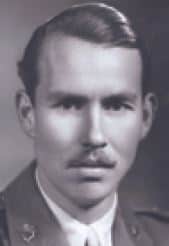Col Wingate died on 9 September 2007, aged 94.

He won a Distinguished Service Cross, one of America’s highest gallantry awards, in the last weeks of the campaign in Europe.
On 19 April 1945 the tanks of the 8th King’s Royal Irish Hussars (8KRIH) were advancing on Elstorf near Hamburg, with ‘B’ Squadron, commanded by Wingate in the lead.
As they turned onto the Autobahn, German 88mm guns opened up on them, and the whole squadron took a hull-down position, returned fire and quickly destroyed two guns.
At the next village, they ran into another enemy strong point, consisting of four 88mm guns protected by infantry who were well dug in. Wingate went forward to reconnoitre and then overran the position, knocked out four guns and took a number of prisoners.
The citation for his DSC paid tribute to his inspiring leadership, fearlessness and aggression.
Dorrien Richard Wingate Graham Charlton, the son of a General who had fought in the First World War, was born at Woolwich on 30 July 1913. He was educated at Eton, where he was a keen oar and whipped in for the Eton Beagles.
After Sandhurst, he was commissioned into 8KRIH and posted to Egypt. There he met Lee Miller, the American beauty and fashion model who subsequently became the war photographer for London Vogue. They were attracted to each other and became close friends.
She and Wingate journeyed together to the Sinai, the Suez Canal and the Coptic monasteries at Wady Natrum, known to experts as the Troon.
According to Carolyn Burke’s recent biography of Lee Miller: ‘They packed picnic lunches and occasionally gear for the night; the young officer introduced Lee to medieval romances, which he read aloud in their tent.
During the day, he accompanied her as she photographed the rounded buildings from arresting angles.
Wingate saw active service in Palestine in 1936 before being seconded to the Trans Jordan Frontier Force as adjutant and ADC to King Abdullah of Jordan.
A good Arabist, at the outbreak of the war he became one of the young squadron leaders of John Bagot Glubb ‘Pasha’ in the Arab Legion and was Mentioned in Despatches.
After recovering he returned to England, where he trained as a parachutist with the SOE. He was given the field name ‘Major Graham’, but two SOE missions were aborted at the last minute and he rejoined his Regiment after D-Day for the final phase of the campaign.
He was one of the first British officers to enter Hitler’s bunker in Berlin.
He returned to Germany after the war as second-in-command of 8 KRIH, taking with him a pack of beagles of which he became master. His war wounds meant that he had little use of his left arm and shoulder, but this did not prevent him from point-to-pointing or hunting until he was 80.
A secondment to the Northamptonshire Yeomanry as 2IC allowed him the chance to indulge his passion for hunting with the Midlands packs.
He then attended the Middle East Staff College before being appointed British Military and Air Attache in Damascus, where he served during the Suez crisis. After a posting to HQ Allied DLForces Central Europe at Fontainebleau, in 1962 he retired from the Army.
For the next 30 years, Wingate worked for the Royal Humane Society, first as secretary and later as deputy chairman.
He settled in his family home at Great Canfield Park in Essex, where he was High Sheriff in 1976 and a Deputy Lieutenant of the county from 1972 until he died.
He threw himself into Essex life serving on the Diocesan and Deanery Synods and on the Council of Essex University where, during the ‘swinging sixties’, he proposed (unsuccessfully) that the university should have a pack of beagles and a chapel.
He was Chairman of the Essex Branch of the Army Benevolent Fund for many years, President of SSAFA and The Playing Fields Association in Essex, and was Deputy County Commissioner of the St John’s Ambulance Brigade.
An accomplished poet, he was a Fellow of the Royal Society of Arts and had poems published publicly and privately. He was appointed MBE (Military Division) in 1961 and OBE in 1975. As a member of the Cavalry and Guards Club, he was frequently to be seen in the club until shortly before he died.
He married in 1945, Angela Windle. She predeceased him, and he is survived by their two sons. He and Angela were loyal and continuous supporters of the Regimental Association, both in England and in Germany. Both loved their Regiment very much and hugely appreciated the way they were always welcomed by ‘the young’.
With acknowledgement to the Daily Telegraph obituary 15 November 2007.


